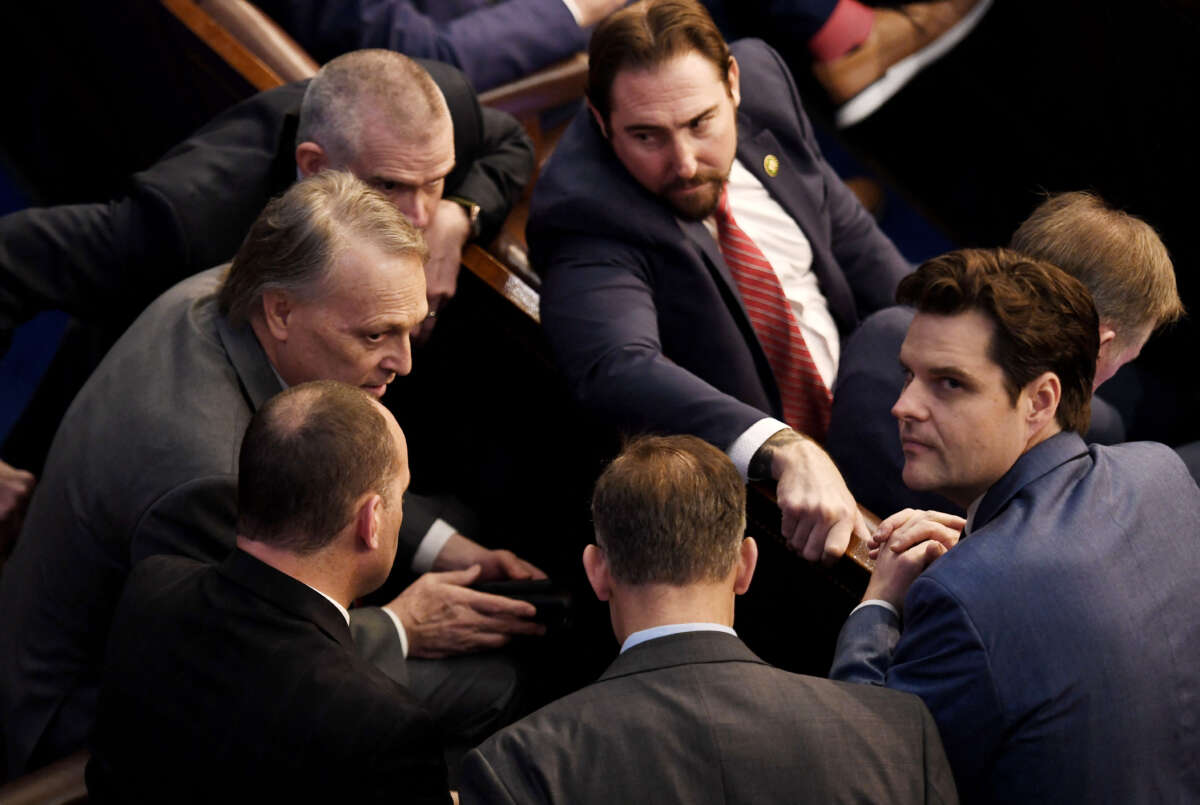On the eve of the anniversary of the January 6 attack on the Capitol, experts say the House GOP’s failure to choose a speaker despite multiple rounds of balloting this week demonstrates the power wielded by far right extremists over both the Republican Party and the nation’s broader political atmosphere.
In the two years since former President Donald Trump’s “Stop the Steal” rally morphed into the January 6 mob, the movement behind the deadly riot spread out and became a more localized phenomenon, with militia groups and far right activists targeting LGBTQ people and public institutions such as school boards and libraries in their communities.
The rising tension on social media over hate speech, anti-transgender rhetoric and right-wing misinformation was punctuated by an increase in targeted violence and mass shootings targeting a Black neighborhood in Buffalo, New York, and a LGBTQ club in Colorado Springs. Experts say the greatest threat of domestic terrorism arises from the far right, not the anti-fascist left, despite ongoing efforts by Trump and other conservatives to draw a false equivalence between the two movements.
“What we are seeing now are the ongoing results of both [January 6] and the way that Trump really opened the door for bigoted and anti-democracy groups to enter the mainstream of politics,” said Lindsay Schubiner, director of a counter-extremist program at the Western States Center, in an interview.
Bigotry and extremism are problems nationwide, but Schubiner said there is a particular history of fringe movements in western states such as Oregon, Texas, Washington and Colorado, where white supremacists have gathered for decades and routinely target liberal enclaves in cities such as Portland and Houston. Militias and “Christian nationalist” groups regularly post viral videos of their members gathering outside drag shows and other LGBTQ events and clashing with anti-fascist counterprotesters.
“The insurrection two years ago saw this coalescing of a range of bigoted and anti-democracy groups, and they have continued to work together, spreading bigotry to build political power,” Schubiner said.
Back in Congress, a group of 20 far right House Republicans leveraged the GOP’s razor-thin majority to blockade Republican leader Rep. Kevin McCarthy’s bid for speaker, showcasing the deep ideological divisions between moderates and members who are still bristling with MAGA energy and eager to catch the spotlight. As of Wednesday, McCarthy was unable to secure a majority in six votes, with defectors rallying behind Rep. Byron Donalds of Florida.
The 20 Republicans include a dozen who have denied the results of the 2020 election, and almost every incumbent voted against certifying the results despite the Trump-inspired riot on January 6. Schubiner said several prominent McCarthy defectors — including Rep. Lauren Boebert, Rep. Paul Gosar, Rep. Andy Biggs and Rep. Matt Gaetz — have embraced conspiracy theories such as the racist “great replacement” theory about immigration.
“Bigoted conspiracy theories have served as an accelerant for white nationalist and other anti-democracy movements to reach people and build power,” Schubiner said.
Still, McCarthy maintained support among other right-wing figures, including self-described Christian nationalist Rep. Marjorie Taylor Greene of Georgia, who has complained on social media about the optics of failing to choose a speaker. Greene was likely offered plum committee assignments after being kicked off committees in the last Congress, and critics say McCarthy made a host of other concessions behind closed doors to rally the rowdy MAGA crowd behind him. So far, the Republican leader has been unsuccessful.
David Brock, president of bipartisan watchdog group Facts First USA, said McCarthy has already unleashed a “corrupt bargain” by cutting backroom deals with extremists and conspiracy peddlers.
“Whenever a final candidate stumbles into the speakership, it is absolutely imperative that the American people get transparency into what corrupt bargains were struck to gain power,” Brock said in a statement this week. “It is clear that any coming investigations or impeachments from the Republican caucus are already irreparably tainted by backroom dealing with the MAGA extremists who want to undermine democracy.”
Angry, shocked, overwhelmed? Take action: Support independent media.
We’ve borne witness to a chaotic first few months in Trump’s presidency.
Over the last months, each executive order has delivered shock and bewilderment — a core part of a strategy to make the right-wing turn feel inevitable and overwhelming. But, as organizer Sandra Avalos implored us to remember in Truthout last November, “Together, we are more powerful than Trump.”
Indeed, the Trump administration is pushing through executive orders, but — as we’ve reported at Truthout — many are in legal limbo and face court challenges from unions and civil rights groups. Efforts to quash anti-racist teaching and DEI programs are stalled by education faculty, staff, and students refusing to comply. And communities across the country are coming together to raise the alarm on ICE raids, inform neighbors of their civil rights, and protect each other in moving shows of solidarity.
It will be a long fight ahead. And as nonprofit movement media, Truthout plans to be there documenting and uplifting resistance.
As we undertake this life-sustaining work, we appeal for your support. Please, if you find value in what we do, join our community of sustainers by making a monthly or one-time gift.
